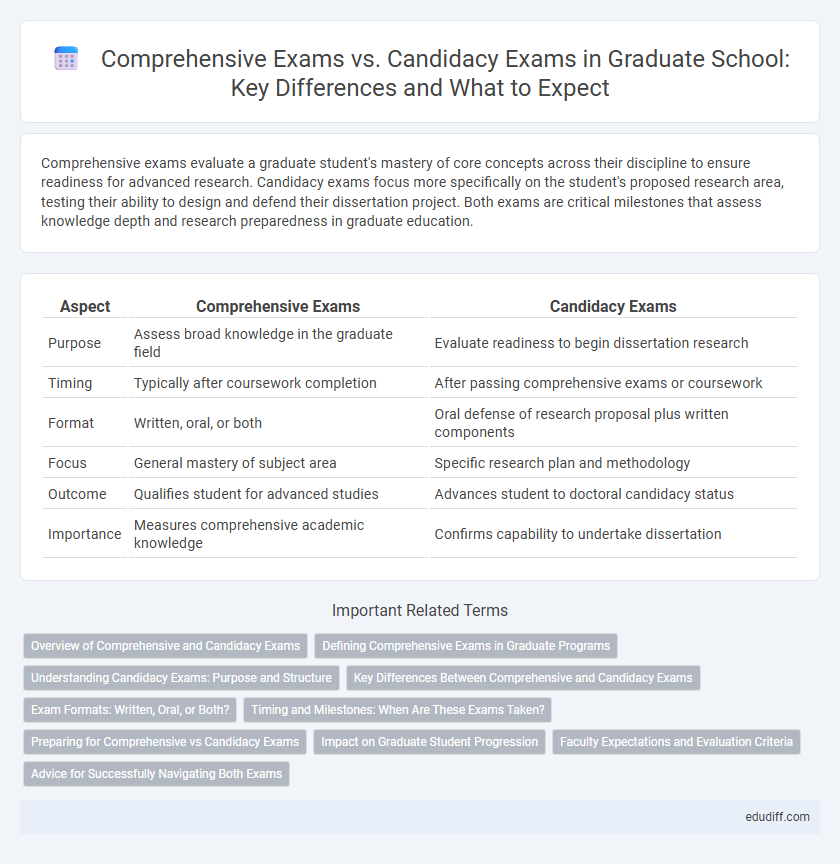Comprehensive exams evaluate a graduate student's mastery of core concepts across their discipline to ensure readiness for advanced research. Candidacy exams focus more specifically on the student's proposed research area, testing their ability to design and defend their dissertation project. Both exams are critical milestones that assess knowledge depth and research preparedness in graduate education.
Table of Comparison
| Aspect | Comprehensive Exams | Candidacy Exams |
|---|---|---|
| Purpose | Assess broad knowledge in the graduate field | Evaluate readiness to begin dissertation research |
| Timing | Typically after coursework completion | After passing comprehensive exams or coursework |
| Format | Written, oral, or both | Oral defense of research proposal plus written components |
| Focus | General mastery of subject area | Specific research plan and methodology |
| Outcome | Qualifies student for advanced studies | Advances student to doctoral candidacy status |
| Importance | Measures comprehensive academic knowledge | Confirms capability to undertake dissertation |
Overview of Comprehensive and Candidacy Exams
Comprehensive exams evaluate a graduate student's mastery of broad foundational knowledge in their field, typically covering multiple subject areas relevant to their discipline. Candidacy exams assess the student's readiness to conduct independent research, focusing on specialized topics aligned with their dissertation. Both exams serve as critical milestones in graduate programs, ensuring academic competence and research preparedness.
Defining Comprehensive Exams in Graduate Programs
Comprehensive exams in graduate programs serve as a rigorous assessment of a student's mastery over the core knowledge and foundational theories within their field of study, typically encompassing multiple subject areas to ensure broad expertise. These exams often consist of written and oral components designed to evaluate critical thinking, synthesis of information, and readiness for advanced research. Passing comprehensive exams is a key milestone that qualifies students to proceed toward dissertation work and candidacy status.
Understanding Candidacy Exams: Purpose and Structure
Candidacy exams evaluate a graduate student's mastery of core knowledge and readiness to undertake independent research, serving as a critical milestone in doctoral programs. These exams typically consist of written and oral components that assess both comprehension of discipline-specific concepts and the ability to formulate research questions. Passing candidacy exams formally transitions students to doctoral candidate status, enabling them to focus on dissertation research and contribute original knowledge to their field.
Key Differences Between Comprehensive and Candidacy Exams
Comprehensive exams assess a graduate student's broad knowledge across their discipline to ensure foundational competency, while candidacy exams evaluate the student's readiness to conduct independent research specific to their dissertation topic. Comprehensive exams typically occur earlier in the program, covering core coursework, whereas candidacy exams focus on research proposals and methodology. Passing candidacy exams often grants formal PhD candidate status, signaling progression to dissertation work.
Exam Formats: Written, Oral, or Both?
Comprehensive exams often require written responses, oral presentations, or both, designed to assess a graduate student's mastery over core subjects. Candidacy exams typically emphasize oral defense, evaluating the student's readiness to conduct independent research. The exam format varies by program but generally combines written and oral components to ensure thorough academic proficiency.
Timing and Milestones: When Are These Exams Taken?
Comprehensive exams are usually taken after completing most coursework, marking the transition from structured classes to research focus, typically in the second or third year of graduate study. Candidacy exams follow, serving as a formal assessment of a student's research proposal and readiness to conduct independent research, often held shortly after passing comprehensive exams. These milestones define the shift from coursework completion to active dissertation research phases in graduate programs.
Preparing for Comprehensive vs Candidacy Exams
Preparing for comprehensive exams requires extensive review of core subject material, often involving synthesizing knowledge across multiple disciplines to demonstrate a broad understanding of the graduate program. Candidacy exam preparation emphasizes mastering specialized research topics and formulating original contributions relevant to one's dissertation focus. Efficient study strategies include creating detailed outlines, practicing past questions, and engaging in peer discussions to enhance critical thinking skills tailored to each exam type.
Impact on Graduate Student Progression
Comprehensive exams assess a graduate student's mastery of core knowledge and serve as a critical milestone to ensure readiness for advanced research, directly influencing timely progression through the program. Candidacy exams evaluate a student's research proposal and methodology, determining eligibility to proceed with dissertation work and impacting their transition from coursework to focused inquiry. Both exams function as pivotal checkpoints that shape the academic trajectory and time-to-degree completion for graduate students.
Faculty Expectations and Evaluation Criteria
Faculty expectations for comprehensive exams emphasize a broad mastery of core coursework, assessing students' ability to integrate foundational knowledge across multiple areas. Evaluation criteria prioritize depth of understanding, critical thinking, and the capacity to synthesize information relevant to the discipline. Candidacy exams, by contrast, require demonstration of specialized expertise and readiness to conduct independent research, with faculty focusing on originality, methodological rigor, and proposal quality.
Advice for Successfully Navigating Both Exams
Thorough preparation for comprehensive exams requires mastering broad subject knowledge, while candidacy exams demand deep specialization and original research methodology understanding. Develop a detailed study plan that includes reviewing key literature, practicing past exam questions, and seeking feedback from advisors and peers. Prioritize time management, stay organized, and maintain a consistent study schedule to build confidence and reduce exam stress.
Comprehensive Exams vs Candidacy Exams Infographic

 edudiff.com
edudiff.com